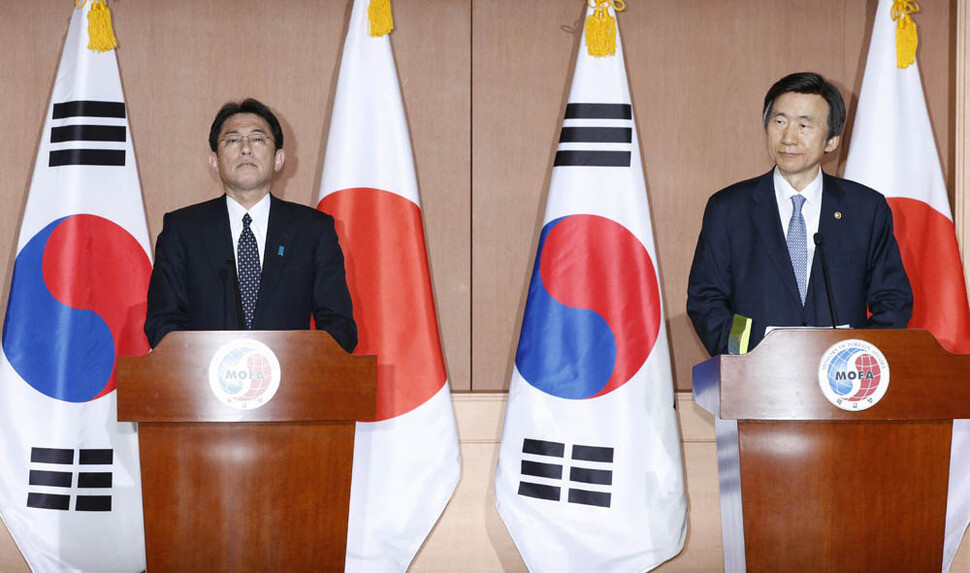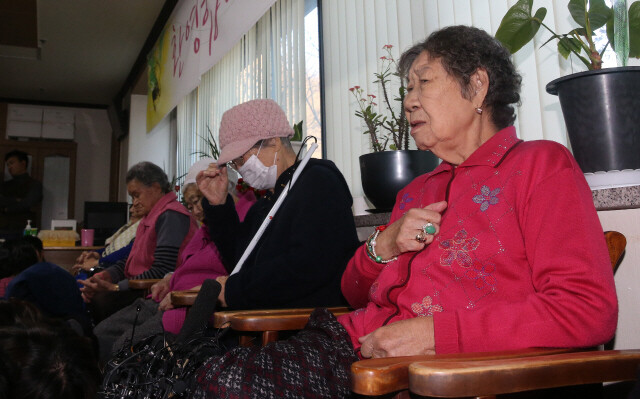hankyoreh
Links to other country sites 다른 나라 사이트 링크
[Editorial] No final resolution without legal responsibility on comfort women issue

The South Korean and Japanese governments declared they were “finally and irreversibly resolving” the comfort women issue on Dec. 28 with their announcement of an agreement on the matter. But the actual agreement announced by their foreign ministers after talks in Seoul that day was a far cry from any real solution. Most crucially, it fails to clearly state the Japanese government’s legal responsibility for the state-level crime of enforcing a system of sexual slavery.
Far from a real solutionAccording to the agreement, the Japanese government is to state its “painful awareness” of responsibility for the comfort women issue, with Prime Minister Shinzo Abe expressing his heartfelt apologies and remorse for it. Tokyo is to undertake projects on behalf of the victims at government expense, and the two governments are to refrain from criticizing one another over the issue in international settings. The South Korean government, for its part, is to work toward relocating a statue of a young girl -- symbolizing the victims -- that currently sits in front of the Japanese embassy in Seoul.
All of the announced plans are clearly a step forward from the Abe administration’s previous denials of the problem’s very existence. It’s also the first time Abe has discussed “responsibility” for the matter and “apologies and remorse” for the victims. It arguably represents a new attitude from an administration that has thus far stood for historical revisionism.
But the agreement also falls short in many of the same ways as other ideas suggested by Tokyo in the past that were not accepted. After a 1993 statement by then-Chief Cabinet Secretary Yohei Kono acknowledging the forcible nature of the comfort women’s mobilization, the Asian Women’s Fund was established in Japan in 1995. In 1997, the fund provided South Korean comfort women survivors with initial payments of two million yen (US$16,620) and a written apology from then-Prime Minister Ryutaro Hashimoto.
The measure didn’t constitute a solution, as it did not acknowledge the legal responsibility of the Japanese government. The payments made by Japan were less compensation for wrongdoing than a kind of “support fund.” In 2012, the Japanese government suggested what became known as the “Sasae plan” to the South Korean administration of then-President Lee Myung-bak. Its terms included an apology to the South Korean President by the Japanese Prime Minister, a visit by the Japanese ambassador in Seoul to apologize to comfort women survivors, and compensation out of the Japanese government budget. This too was inadequate; while the amount of support was slightly higher, it was otherwise equivalent to the plans that had come before. The Abe administration pledged to honor Kono’s statement, but references to the forcible nature of mobilization were instead dropped.
It’s also strange that the two governments would refer to such an agreement as a “final and irreversible solution.” Neither has the right to proclaim an agreement “final” when it doesn’t acknowledge legal responsibility. The proper stance would be to watch and see to what extent the terms are acceptable to the survivors themselves, the South Korean public, and the international community.
It’s impossible not to comment on Seoul’s hasty handling on this issue, which has left it looking like it’s playing second fiddle to an incomplete solution presented by Tokyo. It goes against the stance of previous administrations, which have stressed the matter of legal responsibility. It makes no sense to have the South Korean government setting up a foundation to support the survivors while Japan pays. And it’s inappropriate for Seoul to mention the statue issue at all. Prior to agreeing to these terms, the South Korean government made no attempt to hear views on the matter from the people most directly impacted by it -- the survivors themselves. If it’s a question of President Park Geun-hye trying to honor her previous promises to resolve the issue within the year, or a reflection of Washington’s calls for closer trilateral cooperation, then that’s an even bigger problem. The administration shouldn’t be foisting an agreement that goes against principle on the South Korean public as a “diplomatic solution.”
If Japan truly wants a “final resolution” on the comfort women issue, it wouldn’t be that difficult. All it would have to do is openly own up to legal responsibility, rather than engaging in a bunch of complicated reasoning. There’s also an element here of accepting what is now considered objective historical truth. Tokyo may claim that all questions of legal responsibility for Japan’s colonization of Korea were settled with the Treaty on Basic Relations in 1965, but the comfort women issue was never discussed at the time; it did not become an international issue until the early 1990s.
The United Nations has repeatedly affirmed that the Japanese military’s “comfort stations” were a system of wartime sexual slavery in violation of international law. The reason so many other comfort women statues are going up around the world is because people elsewhere share the understanding of the issue as an unresolved war crime. The other issues, too, would go away with an admission of legal responsibility. That, not compensation or “support,” is what the survivors want most of all. Roundabout approaches like this one will never bring a full resolution on the comfort women issue.

Instead of declaring the issue resolved with the current agreement, we could say we’re at a new starting point. After all of its past denials, the Abe administration has finally arrived on the same page as other administrations before it. Seoul and Tokyo know better than anyone what would constitute a real solution. No matter how important their relations may be, we can’t just slap a Band-Aid on the issue and call it fixed. Rather than talking about how the comfort women issue is “finally resolved,” we should be ushering in new talks toward a real solution.
Please direct questions or comments to [english@hani.co.kr]

Editorial・opinion
![[Editorial] Does Yoon think the Korean public is wrong? [Editorial] Does Yoon think the Korean public is wrong?](https://flexible.img.hani.co.kr/flexible/normal/500/300/imgdb/original/2024/0417/8517133419684774.jpg) [Editorial] Does Yoon think the Korean public is wrong?
[Editorial] Does Yoon think the Korean public is wrong?![[Editorial] As it bolsters its alliance with US, Japan must be accountable for past [Editorial] As it bolsters its alliance with US, Japan must be accountable for past](https://flexible.img.hani.co.kr/flexible/normal/500/300/imgdb/original/2024/0417/6817133413968321.jpg) [Editorial] As it bolsters its alliance with US, Japan must be accountable for past
[Editorial] As it bolsters its alliance with US, Japan must be accountable for past- [Guest essay] Amending the Constitution is Yoon’s key to leaving office in public’s good graces
- [Editorial] 10 years on, lessons of Sewol tragedy must never be forgotten
- [Column] A death blow to Korea’s prosecutor politics
- [Correspondent’s column] The US and the end of Japanese pacifism
- [Guest essay] How Korea turned its trainee doctors into monsters
- [Guest essay] As someone who helped forge Seoul-Moscow ties, their status today troubles me
- [Editorial] Koreans sent a loud and clear message to Yoon
- [Column] In Korea’s midterm elections, it’s time for accountability
Most viewed articles
- 1[News analysis] After elections, prosecutorial reform will likely make legislative agenda
- 2[Column] The clock is ticking for Korea’s first lady
- 3‘Right direction’: After judgment day from voters, Yoon shrugs off calls for change
- 4Samsung barricades office as unionized workers strike for better conditions
- 5[Editorial] Does Yoon think the Korean public is wrong?
- 6Korea, Japan jointly vow response to FX volatility as currencies tumble
- 7[Editorial] When the choice is kids or career, Korea will never overcome birth rate woes
- 8S. Korea, Japan reaffirm commitment to strengthening trilateral ties with US
- 9Faith in the power of memory: Why these teens carry yellow ribbons for Sewol
- 10Japan officially says compensation of Korean forced laborers isn’t its responsibility